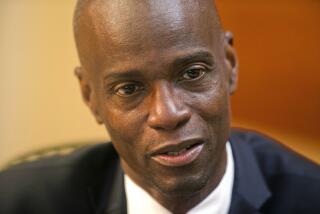U.S. Seeks to Freeze Assets of Suspected Haiti Coup Backers
WASHINGTON — The Bush Administration is moving to freeze the U.S. assets of wealthy Haitians suspected of secretly bankrolling the mid-level Haitian army officers who are at the core of the military junta’s resistance to restoring democratic rule, a top State Department official said Thursday.
Testifying before a House Foreign Affairs Western Hemisphere subcommittee, Assistant Secretary of State Bernard Aronson said the State Department has begun to compile lists of names of suspected backers of these officers and their men, “wealthy individuals with ties to the Duvalierist regime who are continuing to finance this.”
Aronson said that the names, collected by the U.S. Embassy in Haiti, will be turned over to the Treasury Department after the State Department’s Latin America bureau, which Aronson heads, is satisfied that no innocent parties are listed. Treasury, acting under authority of the executive order that President Bush signed early in October to block all payments to the junta and freeze its assets, then would freeze any funds these coup backers have in the United States.
Aronson said the Organization of American States and the United States would have to “consider very seriously” any additional action if the current tough trade sanctions fail to restore to power President Jean-Bertrand Aristide.
Among options suggested since Aristide was deposed in a Sept. 30 coup is military intervention by an OAS-sanctioned multilateral force, although U.S. officials have strongly resisted the use of force. And Aronson cautioned that Aristide had not changed his publicly expressed opposition to an intervention by force.
But he conceded that trade sanctions now imposed by the United States and most OAS member states are “a sledgehammer, not a scalpel,” that could wreak widespread havoc and suffering in the hemisphere’s poorest country if imposed for many months.
“I don’t think the status quo can prevail there for two months,” Aronson said, conceding under questioning from Rep. Stephen J. Solarz (D-N.Y.) that he sees only a 60% chance of the sanctions succeeding within two months.
If the situation deteriorates, Aronson said, in part it would be up to Aristide to reconsider his opposition to intervention. The prospect of a multilateral force under the OAS “is an option that would have to be considered very seriously by the OAS, and the United States would have to consider it very seriously,” he said.
Bush has pushed the United States into the forefront in orchestrating OAS opposition to the Haitian junta but has publicly rejected military intervention.
“I think the coup was not from the top down,” Aronson said. “There was real discontent in two companies of the Haitian army. It was rank-and-file soldiers in the streets and mid-level officers.”
More to Read
Sign up for Essential California
The most important California stories and recommendations in your inbox every morning.
You may occasionally receive promotional content from the Los Angeles Times.










